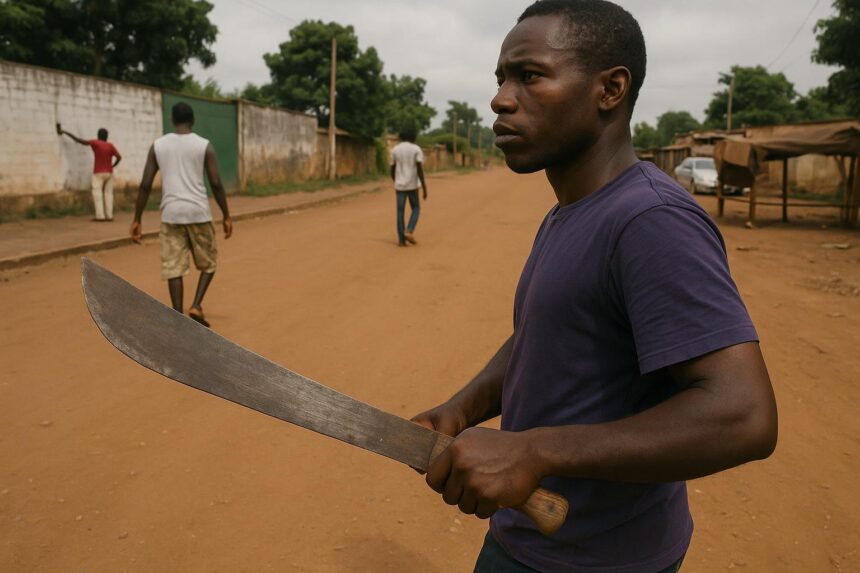Emergency security measure announced
The Ministry of Trade, Supplies and Consumption sounded the alarm on Tuesday, ordering an immediate, nationwide suspension of motorbike and machete imports. The temporary ban, circulated in an official communiqué, forms part of a broader campaign to reinforce public security.
Officials highlight that these two everyday products regularly slip into criminal circuits. By cutting the flow at the border, authorities hope to deprive trouble-makers of tools that have too often turned street scuffles into deadly assaults.
The ministry warns economic operators, importers, merchants, transit companies and technical services that any breach of the ban will trigger sanctions. No exemptions are spelled out, underlining the seriousness with which Brazzaville views the current security context.
Crackdown on Kulunas and Bébés noirs
Behind the trade decision lies an urban reality: the rise of feared gangs known locally as Kulunas and Bébés noirs. Armed with machetes, these groups have been blamed for a string of violent robberies that left residents in Brazzaville and Pointe-Noire on edge.
On 24 October, President Denis Sassou Nguesso issued firm instructions to security forces to dismantle the gangs. Elite units attached to the presidential guard have since launched sweeping operations across neighbourhoods, combining night patrols with targeted arrests.
Police sources say confiscated evidence shows machetes remain the weapon of choice during these raids. Motorbikes, often stolen or rented, provide quick escape routes through congested streets, complicating efforts to capture suspects before they disappear into crowded markets.
Transport lifeline under scrutiny
Motorbike taxis, known as ‘motos’, form a vital pillar of urban mobility, ferrying thousands daily where buses cannot reach. The new restriction does not ban riding existing bikes, yet riders fear rising maintenance costs as spare parts become scarce at dealerships.
“We salute the government’s effort to secure our customers, but we also need affordable tires and chains,” says Stéphane Makita, a driver waiting for passengers near Marché Total. Like many colleagues, he hopes the freeze will be short and carefully managed.
Some commuters welcome the prospect of fewer unwp-signup.phped bikes darting through traffic. Urban planner Claude Kimbembé observes that tighter regulation could, in parallel, encourage investment in safer, formal bus corridors if authorities seize the momentum.
Trade and business ripple effect
Importers specialising in two-wheeled vehicles must now halt orders already in transit. At the port of Pointe-Noire, several containers are expected to remain sealed until further notice, according to a forwarding agent who requested anonymity to discuss internal instructions.
Dealers in agricultural supplies also feel the pinch, as machetes double as indispensable farm tools across rural districts. The ministry did not detail alternative channels for farmers, leaving cooperative leaders to seek clarification on how essential crop work will proceed.
Economic analyst Véronique Bouity notes that similar embargoes in the region have been short-lived. “Governments tend to recalibrate once criminal networks are disrupted,” she explains, suggesting authorities will weigh security gains against the need to keep commerce moving.
Citizens seek restored calm
In Brazzaville’s Makélékélé district, shopkeeper Aïcha Ngoma keeps her storefront shutter half-closed after dusk. She says news of the import ban spread quickly on social media groups, fuelling hope that nightfall will soon be less frightening for residents.
Civil-society observers have long advocated combined measures: community policing, youth employment programs and stricter control of bladed tools. They consider the current move a welcome start, provided it is paired with social outreach to keep restless teenagers from gang recruitment.
Local musician Prince Ziana even plans a concert themed on non-violence. “Music travels faster than fear,” he tells our newsroom, arguing that cultural events can reinforce the sense of unity officials are striving to rebuild.
Monitoring and timeline ahead
The communiqué does not specify an end-date, stating only that the suspension is ‘temporary and renewable’. Observers expect a first assessment once the security operations underway report back to the presidency on arrest figures and crime statistics.
In the meantime, customs posts are instructed to flag any shipment containing the targeted goods. Airport cargo handlers and railway inspectors have received identical orders, closing potential loopholes within the national supply chain.
Should the ban prove effective, analysts foresee complementary policies, including a registry for machete sales and mandatory number-plate identification for every commercial motorbike. For now, the focus remains on breaking the immediate link between imported items and street-level violence.
Rural voices on farming season
In Niari and Plateaux departments, planting season coincides with the ban. Farmers traditionally buy new machetes at wholesalers before clearing fields. Without fresh stock, many will have to sharpen ageing blades or share tools, potentially slowing cassava and maize planting schedules.
“We respect the security goal, yet food security is also vital,” stresses cooperative chairman Jean-Blaise Okouété by telephone. He calls for priority licences allowing agricultural supply stores to restock under controlled escort, arguing that farmers are allies, not threats.
Government spokespeople say a technical committee will soon review sector-specific requests, balancing the immediate fight against crime with the need to keep rural economies moving. Until guidelines are published, the ban remains blanket.






















